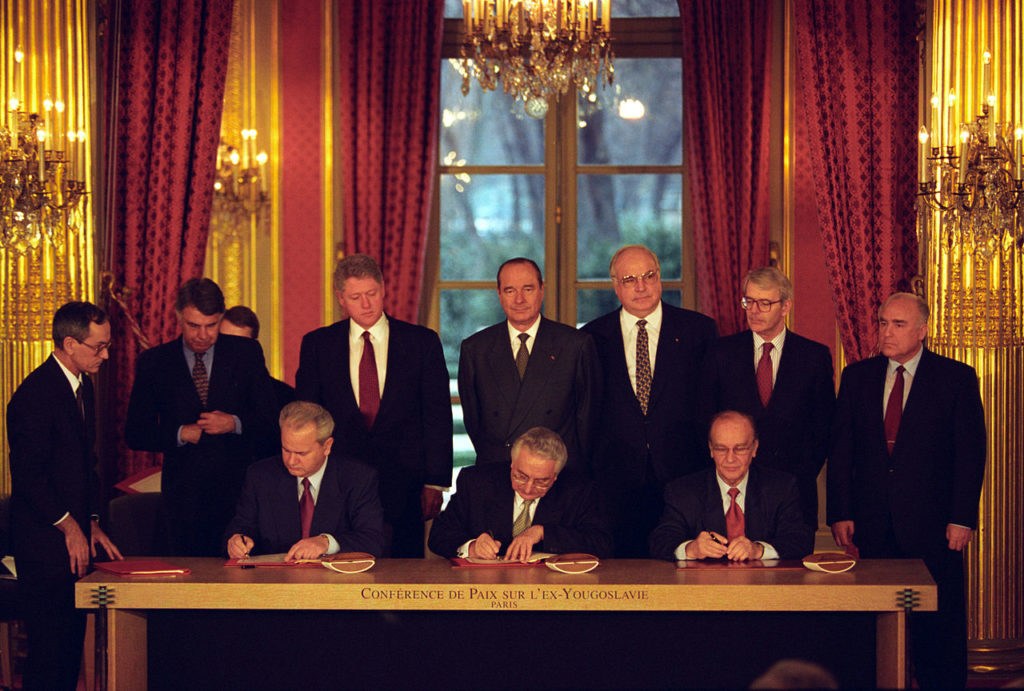The Dayton Agreement officially ended the War in Bosnia 25 years ago - what we can learn from mistakes and why a more robust, common EU foreign policy is needed.
“I didn't understand Sarajevo's uniqueness until I was gone. Before the War it was practically the only city with a multicultural life. Two bells sound better than one. All three together are like an orchestra. That's what I want to hear.” These words were spoken by none other than the Bosnian footballer and coach Ivica Osim. He alluded to the multicultural and multiethnic tradition of his hometown, in which a particular coexistence of religions was a matter of course, where to this day mosques, churches and synagogues are not far from each other.
Osim was head of the Yugoslav national team until 1992. His team had previously dominated qualifying for the 1992 European Championship and was considered one of the title favourites. Due to the War, Yugoslavia was excluded from the tournament (the substitute candidate Denmark ultimately won).
After serbian forces (some units of the Yugoslav Federal Army and what later became the the army of the Republika Srpska) began to besiege and bombard Sarajevo on April 5, 1992, Osim resigned on May 23. At the press conference at the time, he said: “My resignation is the only thing I can do for my city. You should remember that I come from Sarajevo. You know what is happening there.”
Yes, one knew that. The siege lasted 1,425 days, longer than any other siege in the 20th century. It claimed around 11,000 deaths, including 1,600 children. More than 50,000 people were injured (some seriously). The airlift to supply the city lasted longer than the Berlin airlift after the Second World War. The traces of the War can still be seen in the city today.
A painful wound in the humanitarian conscience.
When the siege of Sarajevo began, the War in Croatia had been raging for more than a year. According to the United Nations High Commissioner for Refugees, 1.5 million people were on the run at the time. The brutality of the Bosnian War was a particular shock to Western Europe. In Austria, “Neighbour in Need” (“Nachbar in Not” a combined charity formed by the ORF-Radio and TV, Caritas and Red Cross), was created, which by 1997 raised more than one billion Austrian schillings (around €73 million) for the victims of the Yugoslav wars. Nevertheless, the fact that in the 1990s, due to the large numbers of refugees from South-eastern Europe, specific political forces deliberately escalated xenophobia and then turned it into an election campaign issue is still a painful wound in our country's humanitarian conscience.
It also hurts that, apart from the generous aid and the reception of refugees, it seemed hardly possible for us Europeans to end the bloody aggression (including massacres like the one in Srebrenica) ourselves. Once again, it needed US action. As early as 1992, the then-Senator Joe Biden called for military support for Bosnia against the aggression from Belgrade, and in 1994 he visited the besieged Sarajevo. In particular, due to his pressure, former US President Bill Clinton actively pushed for negotiations.
These negotiations were brought to a successful conclusion in Dayton, Ohio in November 1995. Moreover, 25 years ago, on December 14, 1995, the Serbian President Slobodan Milosevic, the Croatian President Franjo Tudjman and the Chairman of the Bosnian-Herzegovinian Presidium, Alija Izetbegovic, signed the Dayton Agreement in Paris, which finally formally ended the Bosnian War.
It had cost nearly 110,000 lives. However, this is only the minimum assumption - some estimates are much higher. Around 40 per cent of the dead were civilian victims, four-fifths of them Bosnians. 2.2 million people had been displaced or fled. Who knows what atrocities could have been prevented had the international community intervened more courageously earlier?
Bosnian politicians advocate a revision of Dayton.
The Dayton Agreement ended the immediate military threat to Bosnia and Herzegovina and created a post-war order, which, however, had to recognize certain set realities, especially with the establishment of the Republika Srpska, and tried to create a balance between the ethnic groups. Accordingly, Bosnia and Herzegovina is organized today in a rather complicated and confusing manner. Since 2004 an international force called Eufor, under EU command is responsible for maintaining order.
Nowadays Bosnian politicians often make a partially undisguised demand that Dayton needs to be revised to make the country more independent, more capable of acting and, above all, more capable of reform. The election of Joe Biden as US President, who almost 30 years ago paid attention to the region, is accordingly seen with a sure hope by many in Bosnia and Herzegovina. It is currently unclear whether he will or can fulfil their hopes. From a European point of view, however, it is tragic enough that even 25 years after the Dayton Agreement, it is primarily the (future) US President on whom the hopes of Southeast Europeans rest - and not Europe's ability to act. Europe is paying the price for the fact that the 27 EU member states still do not speak with a strong and united voice!
Philipp Jauernik is a historian and federal chairman of the Paneuropean Youth Austria, as well as editor-in-chief of magazine “Couleur”.


